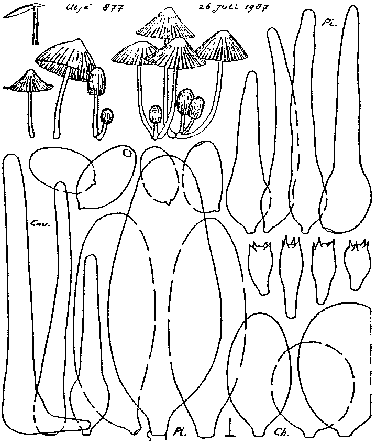Macroscopic features |
Closed pileus up to 6 x 5 mm, ochre-brown at centre (Mu. 7.5 YR 4/6, 10 YR 4-5/4, 6/5), paler towards margin (10 YR 4-5/3, 6/6, 7/2), up to 16 mm in diam. when expanded. Lamellae narrowly adnate, white to blackish; L= 16-24, l= 1-3. Stipe 20-30 x 1-1.5 mm, whitish, pubescent from setulae. |
Microscopic features |
Spores [40,2,1] 10.3-13.1 x 5.8-7.1 µm, av. L= 11.8, av. B= 6.5 µm, Q= 1.60-1.75, av. Q= 1.65, ellipsoid to ovoid; germ pore eccentric, c. 1.8 µm wide. Basidia 16-34 x 9-10 µm, 4-spored. Pseudoparaphyses 4-6 (-7) per basidium. Cheilocystidia vesiculose, 30-55 x 17-35 µm. Pleurocystidia 50-110 x 27-45 µm, ellipsoid, oblong to slightly utriform. Pileocystidia 60-100 x 11-17 µm, lageniform with tapering neck, 4-6 µm wide at apex. Sclerocystidia absent. Clamp-connections present. |
Habitat |
Under shrubs, on branches embedded in mud taken from ditch. Fasciculate. |
Remarks |
Although this species does not grow on dung, it agrees rather well with C. ephemerus in its microscopical characters. The spores, however, are somewhat smaller. Not only this character, but also the smaller fruit-bodies and the different habitat make it probable that this collection represents another species. Coprinus congregatus is rather similar also, but is fimicolous, has no clamps and has somewhat larger pleuro-, cheilo- and pileocystidia. |

[Copyright © by Uljé]